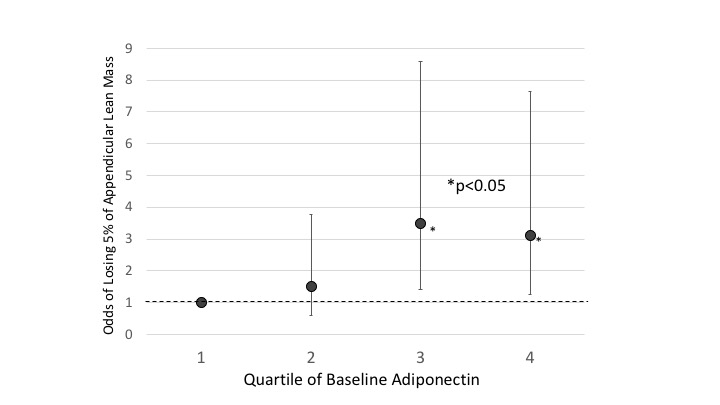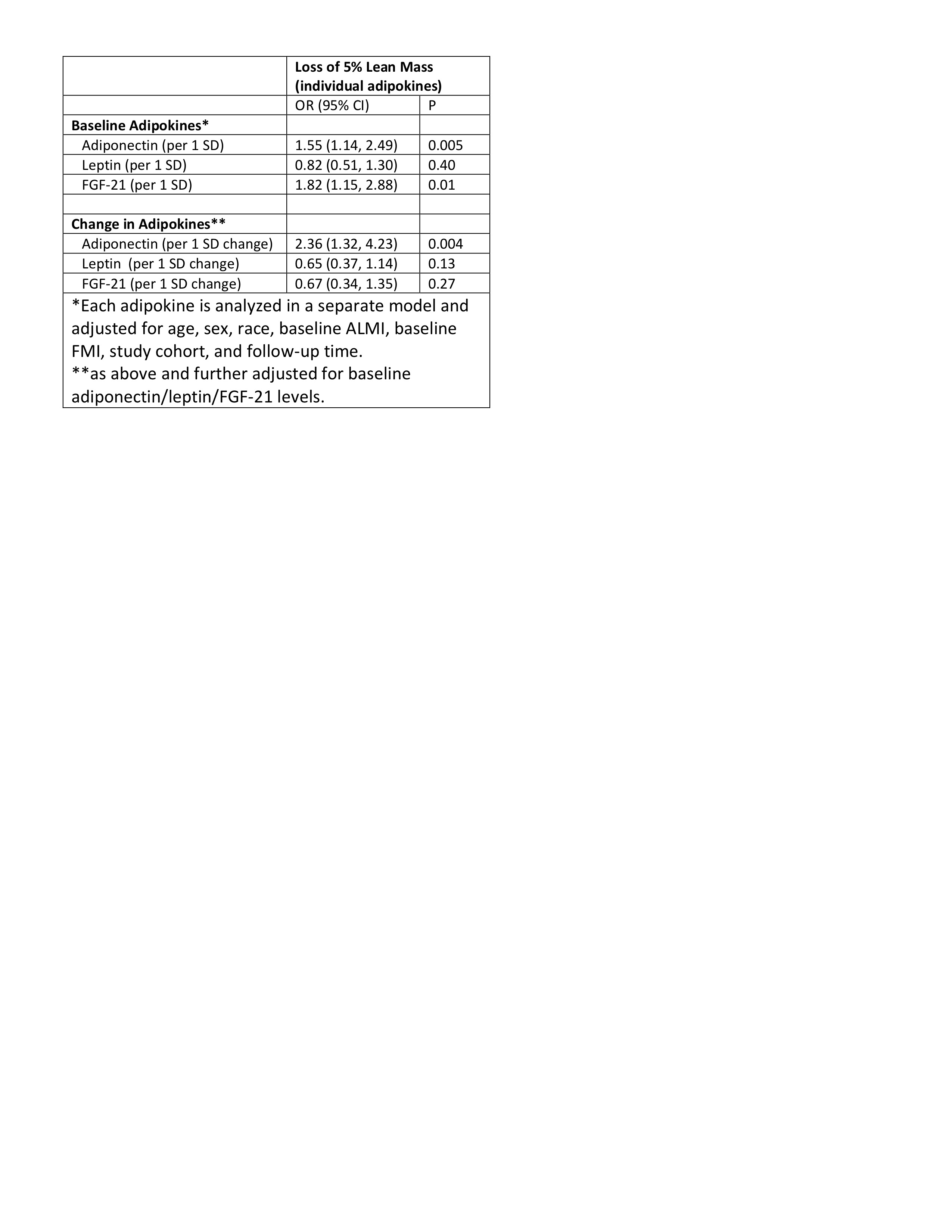Session Information
Session Type: Poster Session B
Session Time: 8:30AM-10:30AM
Background/Purpose: Rheumatoid arthritis (RA) is associated with loss of muscle mass and quality that can have significant impacts on physical functioning and quality of life. Adipokines are fat and muscle-secreted hormones that play a role in regulating metabolism and energy homeostasis and may play a role in the worsening of skeletal muscle deficits in RA. We determined whether adiponectin, leptin, and Fibroblast Growth Factor(FGF)-21 could predict significant declines in skeletal muscle mass over 2-3 years.
Methods: This study combined data from three longitudinal RA cohorts with assessments of whole-body dual-energy absorptiometry (DXA) measures including appendicular lean mass index (ALMI) and fat mass index (FMI). We defined a loss of lean mass as a decrease in ALMI of 5% or more and a loss of FMI as a decrease in FMI of 5% or more. Adiponectin, leptin, and FGF-21 were measured on stored samples. Values were log-adjusted and standardized so that one unit represents a 1 SD change in the exposure. Associations between adipokines at baseline and the change in adipokines during follow-up with long-term changes in ALMI and FMI were assessed using multivariable linear regression, adjusting for demographics, study cohort, and baseline body composition.
Results: A total of 75 (22%) out of 338 participants lost more than 5% of ALMI and 93 (28%) lost >5% of FMI by the time of their follow-up visit over a median (IQR) follow-up of 3 years (2, 3). Those who lost 5% of ALMI had higher adiponectin (per SD) levels at baseline [Mean (SD): 0.40 (1.10) v. -0.048 (1.06), p=0.001], but had similar levels of leptin [Mean (SD): 0.001 (1.04) v. 0.02 (0.96), p=0.87]. In a smaller cohort with FGF-21 levels, levels were higher (per SD) among the 31/159 (16%) who lost ALMI [Mean (SD): 0.28 (0.14) v. -0.17 (0.081), p=0.02]. A higher level of adiponectin (per 1 SD) was associated with a higher probability of losing 5% of ALMI (Figure 1). In multivariable models, participants with higher adiponectin levels had a significantly higher odds of losing 5% of ALMI [OR (per 1 SD): 1.55 (1.14, 2.10) p=0.005] (Table 1). Higher FGF-21 levels were also associated with a higher odds [OR: 1.82 (1.15, 2.88) p=0.01]. Leptin levels were not associated in similar models [OR (per 1 SD): 0.82 (0.51, 1.30), p=0.40]. In addition, after adjusting for baseline adiponectin levels, an increase in adiponectin during follow-up was associated with higher odds of losing 5% of ALMI [OR (per 1 SD change): 2.48 (1.37, 4.50), p=0.004]. Associations between adipokines and changes in ALMI were not attenuated by adjustment for C-Reactive Protein, pain scores, or results of the Health Assessment Questionnaire at baseline (not shown). Adipokines were not associated with loss of FMI.
Conclusion: Elevated adiponectin and FGF-21 levels as well as increasing levels of adiponectin are associated with declines in lean mass over long-term follow-up. These observations support the hypothesis that alterations in adipokines including elevations in adiponectin are associated with an adverse metabolic phenotype in patients with RA and may identify patients at risk of sarcopenia or cachexia. Further study is needed to determine whether elevations in adiponectin are associated with other long-term clinical outcomes in RA.
To cite this abstract in AMA style:
Baker J, Giles J, Gould P, Katz P. Adipokines and Loss of Lean Mass Among Patients with Rheumatoid Arthritis [abstract]. Arthritis Rheumatol. 2021; 73 (suppl 9). https://acrabstracts.org/abstract/adipokines-and-loss-of-lean-mass-among-patients-with-rheumatoid-arthritis/. Accessed .« Back to ACR Convergence 2021
ACR Meeting Abstracts - https://acrabstracts.org/abstract/adipokines-and-loss-of-lean-mass-among-patients-with-rheumatoid-arthritis/


